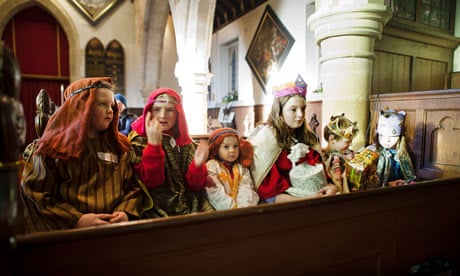There's nothing new in Richard Dawkins's findings about the British way of being religious. But it's always good to be reminded of the findings of a poll commissioned by his Foundation for Reason and Science: that most of us are not "true believers" in either religion or in secularism, and that Britain is neither a religious country nor a secular one, but an interesting mix of both. That doesn't make us muddled, or woolly, or confused – it just makes us British.
We have always been instinctively wary of the bright-eyed, fanatical enthusiast, of whatever hue. We don't really do big ideologies or revolutions – and when we do, we never see them through to their conclusion. We prefer modest proposals, pragmatic solutions, and a bit of muddle – so long as it works. As Kate Fox rightly observes in Watching the English, our natural response to anyone who believes in their own propaganda too much is: "Oh come off it."
Dawkins seems surprised that a majority of us call ourselves Christian (72% in the 2001 census of the population, 54% of his sample of just over a thousand people) but that we don't read our Bibles every day, go to church a lot, know the name of the first book of the New Testament, or believe that we know the truth, the whole truth and nothing but the truth. As a result, he is inclined to dismiss us as not really Christian and – presumably – on the path to the kind of enlightened secularism he espouses. I'm afraid he's likely to be disappointed, and his own poll tells us some of the reasons why.
The fact that a majority of us still call ourselves Christian when occasion demands or a poll forces us to chose is not as insignificant as Dawkins thinks. There are important reasons why we do, and his poll reminds us of some of them. They are confirmed by many existing studies of the religion or the British, including the latest and largest research initiative carried out on religion in this country, the £12m Religion and Society Programme, which I direct.
The single most important reason has to do with our most cherished values, our basic ethical sense. So in answer to the question in Dawkins's poll: "Which of the following statements describe what being a Christian means to you personally?", the largest number (58%) tick the response "I try to be a good person". When I ask people in interviews whether they would call themselves Christian, they often say something like: "Well I'd like to think so." It's an aspiration as much as an affirmation, a sense that Christianity still gives us a good orientation in how we should live, and that values like love, gentleness, thinking of others before self, and doing as one would be done by" still matter most. Perhaps somewhere at the back of our minds we even retain the image of a man on a cross, and recall its heroic message that worldly power is not what really counts, and that there are a few things that are worth dying for.
There are other reasons for accepting a Christian label as well. An important one has to do not so much with believing as with belonging. This can be tribal, or have a class element, though I think this aspect has diminished hugely since the 1960s (as has the element of national belonging). The belonging also has to do with what anthropologist Abby Day calls "natal" – the simple fact of being baptised Christian, which signifies something important about our family ties and continuity down generations. And it may involve loyalty to a locality and neighbourhood, to a place and a building, and to a particular congregation or larger group of like-minded people. It's silly to say these commitments don't matter or don't count – they are still part of the fabric of our towns, villages, families and lives.
None of this makes most of us Christian all the way through. We are critical of many aspects of the church, we don't spend ages poring over doctrine, we don't want clergy telling us what to do, and we are deeply committed to certain secular values as well. Sadly for Dawkins, however, it doesn't make us secular either – especially when you add in his finding that most of us still believe in heaven, hell, the power of prayer, and "fate". Dawkins's remarks actually make it sounds as if he's sorry there aren't more Bible-thumping, placard-carrying Christians around. Come off it Richard – this is Britain you're talking about.




